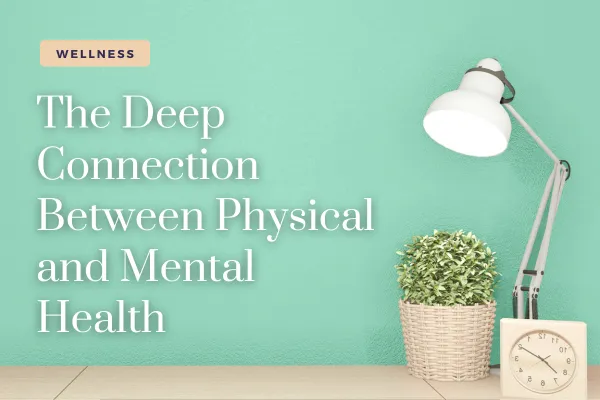
The Deep Connection Between Physical and Mental Health
The Deep Connection Between Physical and Mental Health
Introduction: Clear Your Space, Clear Your Mind
Imagine walking into a cluttered room—laundry on the floor, dishes piled high, papers scattered everywhere. Instantly, your stress rises and focus feels impossible. Now, imagine the same clutter inside your mind: racing thoughts, unfinished tasks, and emotional overwhelm.
Both scenarios feel heavy, don’t they?
The connection between physical and mental health works the same way. When your space is disorganized, your mental clarity suffers. Conversely, when your mind feels cluttered, it’s harder to manage your physical environment. Let’s explore how decluttering your space and mind can create harmony in both areas—and how to get started.

The Science of the Mind-Body Connection
The link between physical and mental health isn’t just a theory; it’s backed by science. Research shows that clutter in your physical environment can elevate cortisol levels, the stress hormone, leading to feelings of anxiety and overwhelm. Meanwhile, mental stress can manifest physically, causing fatigue, headaches, or even weakened immunity.
This interplay happens because your brain and body are constantly communicating. For example:
Chronic stress (mental) can lead to muscle tension and poor posture (physical).
Regular exercise (physical) boosts endorphins, improving mood and reducing anxiety (mental).
By addressing both the physical and mental aspects of your health, you create a feedback loop of positive reinforcement.
How Physical Clutter Impacts Mental Health
Clutter is more than just an eyesore—it’s a trigger for mental chaos. Here’s how it affects you:
Overstimulation: Too many objects in your environment compete for your attention, making it harder to focus.
Decision Fatigue: Constantly deciding what to do with items or where to put them drains mental energy.
Guilt and Shame: A messy space can lead to feelings of failure or inadequacy, even if life’s demands caused the clutter.
Example: Think about the last time you searched for your keys in a pile of stuff. The frustration and time wasted likely left you irritable—a small but impactful example of how clutter affects your mood.
Mental Decluttering: A Path to Physical Wellness
Just as a cluttered space impacts your mental health, mental clutter can weigh on your physical health. When your thoughts are disorganized or overwhelmed by stress, it’s easy to neglect your physical surroundings.
Mental decluttering involves:
Setting Boundaries: Saying no to commitments that drain you.
Prioritizing Self-Care: Making time for activities that nourish your mind.
Organizing Your Thoughts: Journaling, meditating, or creating to-do lists to clear mental clutter.
As your mental load lightens, you’ll find more energy to tackle physical tasks like tidying up or organizing. The two go hand in hand.
Practical Tips to Improve Both Mind and Body
Ready to take action? Start small with these manageable steps:
For Physical Decluttering:
Start with one area: Focus on a single drawer, desk, or closet to avoid overwhelm.
Create categories: Sort items into keep, donate, and toss piles.
Set a timer: Spend 15 minutes decluttering each day—it adds up!
For Mental Decluttering:
Brain dump: Write down all your thoughts to clear your mind.
Practice mindfulness: Spend 5 minutes breathing deeply or meditating.
Limit digital distractions: Unsubscribe from unnecessary emails or delete unused apps.
Simple Steps for Physical and Mental Decluttering:
For Physical Decluttering:
Tidy one drawer or shelf to start small and avoid overwhelm.
Donate unused items to create space and give back.
Wipe down surfaces to refresh your environment.
Set aside 15 minutes daily for consistent progress.
For Mental Decluttering:
Write down your thoughts to clear your mind.
Practice a gratitude journal to focus on the positive.
Meditate for 5 minutes to center yourself and reduce stress.
Plan tomorrow’s top 3 tasks to feel prepared and focused.
Conclusion: Declutter Your Way to a Chill Life
Decluttering isn’t just about organizing your home; it’s about creating a space—physically and mentally—that supports your well-being. Start small, focus on one area at a time, and let each step bring you closer to clarity, calm, and balance.
Remember: A clear space leads to a clear mind, and a clear mind creates the foundation for a healthier, more intentional life.
Ready to create a clearer, calmer life? Start small—because even the smallest action can spark big change. Whether it’s tidying up your desk or taking five minutes to breathe deeply, every step matters. Let’s take this journey together—one space and one thought at a time. 💛
Quick Declutter Checklist:
Before you go, take five minutes to put these tips into action:
Physical Space:
Tidy up one small area (like your desk or a drawer).
Toss or donate one item you no longer use.
Wipe down a surface to refresh the space.
Mental Space:
Write down three thoughts or worries to clear your mind.
Jot down one thing you’re grateful for today.
Take three deep breaths to reset and refocus.
These tiny steps can create a ripple effect of clarity and calm. Why not start right now? 😊
FAQs
1. How does clutter increase stress?
Clutter overstimulates your brain, making it harder to focus and increasing cortisol levels, the stress hormone.
2. What’s the first step to decluttering?
Start small—choose one drawer, desk, or corner to organize. Focus on progress, not perfection.
3. Can decluttering really improve mental health?
Yes! A tidy space reduces stress, boosts focus, and creates a sense of control.
4. How do I mentally declutter when I’m overwhelmed?
Try journaling or a brain dump to organize your thoughts. Small practices like meditation also help.
5. How often should I declutter?
Set a routine that works for you, like a weekly clean-up or monthly deep dive.
6. How can I stay consistent?
Break tasks into small, manageable steps, and celebrate your progress along the way.